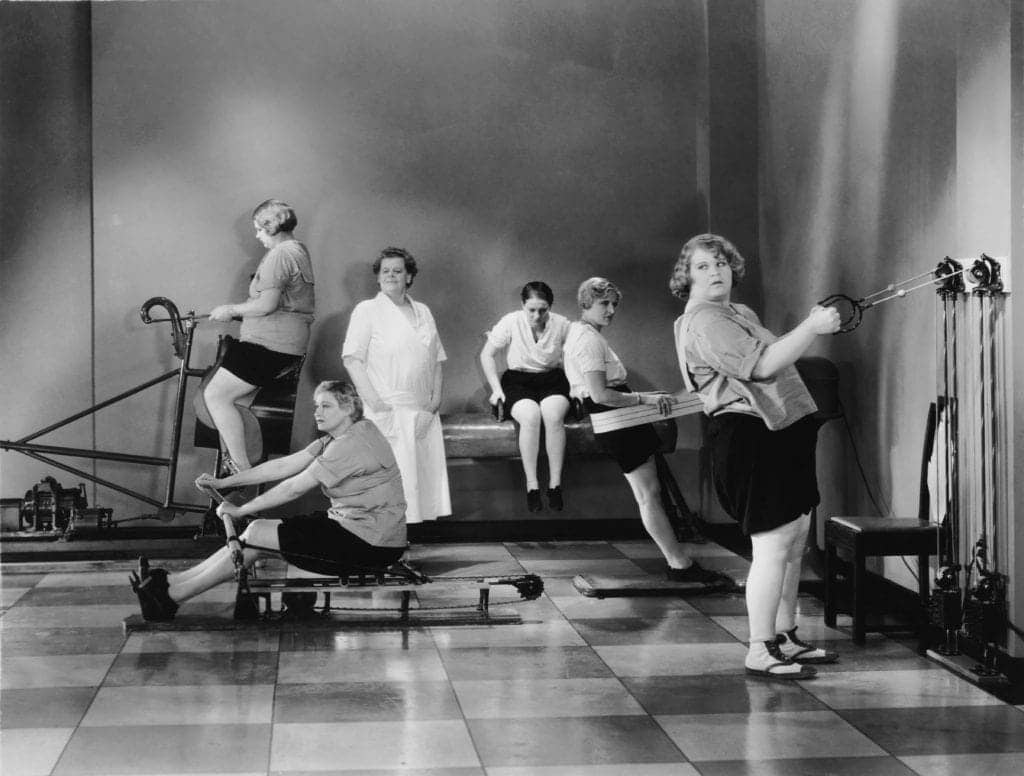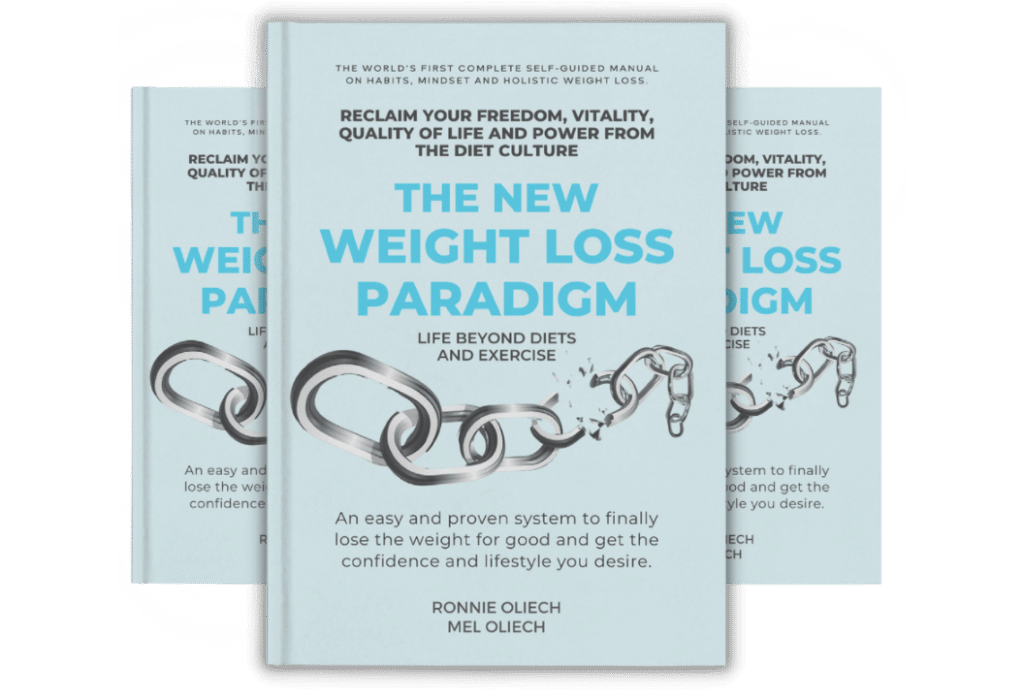We know that there’s a lot of conflicting information about the best approach to weight loss. This can be frustrating and confusing. And following this advice is likely to do more harm than good if your goal is to lose weight and keep it off forever.
We certainly get asked a lot of questions about how to lose weight, so we thought we’d answer them all here, and give you the best, most accurate information to help you on your weight loss journey.
The questions that you need answering will change over time as you progress through your own weight loss journey. Because of this, you might want to bookmark this page so you can come back to it later on. We’ll also be adding to this blog as more questions come up, so be sure to check back here down the track.
What’s the best diet
The diet industry wants you to believe that dieting is the only way to lose weight and keep it off, because that’s how it survives — by selling diet after diet. But research has shown that dieting is not an effective long-term solution for weight loss, with more than 98% of people gaining back whatever weight they lose within two years. The truth is that diets, food restrictions and rules, actually lead to weight gain. Not to mention make you unhappy and cost you an enormous amount of time and money. Our advice is to stop looking for a solution to your problem with diets, and learn to enjoy real, nutritious tasty food without the guilt.
To find out if your weight loss plan is a diet, take our quiz.
What has the biggest impact on my weight — diet or exercise
Whenever someone tries to lose weight the first two things they do is to restrict their food, and increase their exercise. However, the truth is that the best diet and the best exercise program won’t help you lose weight unless you change something else — your habits. You see, the biggest influence over your weight isn’t what you eat, or how much you exercise. It’s why you eat what you do and move how you do. And that comes down to your habits. Your habits are your thoughts, beliefs, mindset and behaviours.
You can find out more about how habits influence your weight, in the following blogs:
What’s a keystone habit and why do you have to focus on it to get results
Changing habits: it’s not what you do, but why you do it
Weight loss transformation is about ‘unbecoming’ and ‘unlearning’ not changing who you are
What exercise should I do to lose weight?
We all know that regular exercise is good for our overall health and wellbeing. It’s also a tool that is used to help people lose weight. Unfortunately, many people don’t fully understand the role exercise plays in weight loss and therefore aren’t able to use it effectively. That’s because the fitness industry had led you astray and told you that exercise has a huge role to play. In actual fact, exercise is just 3% of the weight loss equation. Contrary to popular opinion, cardio exercise is not the best for weight loss. The right combination of weight training, cardio and low-impact activity will give you the best chance at losing weight and keeping it off. You can read more about exercise in these blogs:
Training and exercise: What’s the best workout routine and What’s the best time to exercise?
Will a 10,000 steps per day challenge help me lose weight?
Not necessarily. As we mentioned above, focusing only on exercise is not the answer to long-term weight loss! Walking is a great activity with many health benefits that go way beyond weight loss. However, simply aiming for a certain number of steps each day will not help you lose weight. Aiming for 10,000 steps can lead to increased levels of stress, perfectionism and inconsistency (as it’s not always possible to get 10,000 steps each day). Furthermore, spending your time getting up steps takes you away from the right kind of exercise (see above) that will have the biggest impact on your weight and body shape. Plus, you’re not addressing the key habits that have caused you to gain weight. You can read more about this in our blog Why a 10,000 steps a day challenge is bullshit and what to do instead.
Won’t weight training make me bulk up and put on weight?
Many people are concerned that weight training will make them bulky. However, weight training is one of the best things you can do to lose weight because it helps you change your body composition by building more muscle. Muscle mass is important for weight loss because 66% of your metabolism is influenced by how much muscle you have. The more muscle, the faster your metabolism and the easier it is to lose weight and keep it off. Muscle also takes up less space on your body than fat does. So replacing fat with muscle, will lead to an enormous change in the way your body looks. We explain this in greater detail in our blog “I don’t want to get bulky”: 8 reasons why muscle is your friend.
How often should I train?
It’s a common belief that the more you train, the faster your weight loss. However, this isn’t true. As we’ve already discussed, exercise contributes to just 3% of the weight loss equation. Relying purely on exercise to lose weight is likely to lead to injury and burnout, which will mean your exercise program will be inconsistent. You can find out why consistency is more important than intensity here. To lose weight and change your body shape, you only need to train a handful of hours each week — around 3-4% of your week. Doing too much can cause you to become injured, and it will also increase your stress levels, which have an enormous impact on your weight.
You can find out more about training in these blogs:
How to avoid sports injuries and burnout
What’s the best time to exercise?
Should I follow a meal plan and if so what’s the best one?
We strongly advise against meal plans for weight loss. There are a number of reasons why meal plans don’t help you lose weight for the long-term but the main one is that they fail to address the habits that have led you to gain weight in the first place. The reasons you have become overweight in the first place are not based on what you eat or how you exercise. It comes down to your habits — often the emotional baggage that you carry around with you. No number of meal plans will help you overcome the habits that have caused weight gain. Even if you do lose weight following one, you will end up gaining it all back and more if you go back to what you did before you lost the weight. You can find out more about meal plans and the problems they cause by reading our blogs Why weight loss meal plans suck and Why ready-made ‘diet’ meals are your worst enemy when it comes to weight loss.
Should I cut out carbs?
Cutting carbs is a strategy that is used by a lot of people to lose weight. However, like meal plans, cutting carbs is not the answer. The way to build a body that burns fat is to feed it optimal nutrition so it can function at its best. One of the key food groups that our body needs to work properly are carbohydrates! While you might lose weight by cutting carbs, the weight you lose is likely to be fluid, not fat. In addition, restricting carbs can cause a host of problems that can make it more difficult to lose weight in the long term. You can find out more in our blog Why low-carb or no-carb diets are the problem – NOT the carbs.
Can a fast or a juice cleanse kick start weight loss?
The diet industry would like you to believe that fasts, cleanses and detoxes can kick-start weight loss, or even help you lose weight while you’re on them. But the truth is they are nothing more than a waste of time and money. None have been shown to be an effective strategy for long-term weight loss and there can be some unpleasant side effects to them. In addition, your body already knows how to detox itself, so fasting or cleansing won’t speed up this process. However, the main problem with these programs, is that they are quick-fix measures that don’t fix anything and they certainly don’t address the real reasons you have a weight problem — which are your habits. You can read more in our blog Why juice cleanses and detoxes are a waste of time and money.
Will eating clean help me lose weight?
Eating ‘clean’ is another strategy that many people use to lose weight. In its simplest form, it means eating ‘whole’ or unprocessed foods. However, clean eating is another fad diet that can wreak havoc and make your weight problem worse. One of the key problems is that ‘clean’ eating implies that anything not on the ‘clean’ list is ‘dirty’. This can cause shame and embarrassment around eating, promote secret bingeing, dieting and perpetuates the diet mindset – a mindset that makes it almost impossible to lose weight and keep it off. It also makes you anxious about food and promotes the idea of ‘good’ and ‘bad’ foods, which is extremely problematic. Further information about the dangers of clean eating can be found in our blog Why eating clean isn’t all it’s cracked up to be.
How many cheat days can I have?
If you want to build cheat days into your eating plan, then your eating plan is too strict and rigid. The best approach to weight loss is to focus on eating a wide range of foods that are rich in flavour, texture, and colour. Doing this will ensure that you have the essential nutrition for your body to work optimally — so you can look, feel and function at your best. However, it’s just as important to allow yourself to eat your favourite foods every now and then. Doing so has shown to yield better weight loss results long term, as it decreases the likelihood of binge and emotional eating. You can find out more about why food restriction isn’t an effective strategy for weight loss in our blog Why food restriction, food rules and diets are making you overweight.
I eat really well and training regularly, and can’t lose weight. Why?
This is a problem that many people trying to lose weight have. The reason they struggle is because they have a diet mindset. The diet mindset is a complex set of behaviours that sabotage your weight loss journey without you even being aware. You can find out more about diet mindset in our blog Change your mindset to lose weight fast. Using exercise and food as a way to control your weight ignores the real issues you need to address — your habits. You’re also likely to fall into diet-related behaviours which actually make it harder to lose weight. Our blog Why you’re eating well and exercising regularly and still not losing weight will explain all of this in much greater detail for you
It’s too hard to eat perfectly all the time. What should I do?
You’re right! Trying to be perfect is too hard. But the good news is that you don’t have to be. Trying to be perfect is actually detrimental to weight loss as it causes too much stress — which can inhibit weight loss. You can find out more about that in our blog Why you’re not losing weight despite being perfect. Instead of trying to follow food rules perfectly, we recommend using a boundary strategy instead. Setting up boundaries is a simple way to create more structure in your life and provide you with a guide on what you will and won’t do to ensure that you consistently progress with your weight loss. You can find out more about the boundary strategy and how to create one in our blog Forget diets and food rules: Try this weight loss tip instead.
What should I do when I’m sick?
Being sick can be frustrating. But you don’t need to panic. The most important thing is to look after yourself so you can get better as quickly as possible. Sometimes this means skipping a workout, or doing different exercise. Remember, consistency trumps intensity every time. It’s much better to consistently workout twice a week for 12 weeks, than for 5 days a week for 6 weeks. Taking time off to rest and recover will actually help you remain consistent for longer. To learn more about managing illness, you can read our blog Dealing with sickness: Should you exercise when sick? And what should you eat?
How often should I weigh myself to track my progress?
This is a good question. It’s true that scales are a tool to track weight loss, but they’re not the most reliable tool. Our weight fluctuates regularly — over the course of a day, and throughout the week and these fluctuations are caused by a number of factors that have nothing to do with how much fat you have on your body. Relying on the scales to track your progress is fraught with danger as scales don’t give you the full picture of how you’re progressing. People who focus on the scales end up attaching their self-worth to a number, and then react emotionally to the number — either engaging in emotional eating, switching to another diet, or giving up altogether. If you want to track your progress there are much better ways. Find out what they are in Forget about the scales: There’s a better way of tracking weight loss.
What are the best foods to eat for weight loss?
The best approach to weight loss is to eat a wide range of foods that will deliver great nutrition but won’t leave you feeling bored, hungry or deprived. You can find out more about the best foods for weight loss in the following blogs, The 14 best foods to lose weight, What are good foods for weight loss and what are bad foods? and Foods to eat when trying to lose weight
Isn’t weight loss just a matter of cutting calories and eating less?
There’s a wide-held belief that consuming less than your body needs (i.e. creating a calorie deficit) by cutting calories is the only way to lose weight, and the bigger the deficit the better. Yes, it’s true you need a calorie deficit to lose weight, but the optimal deficit is a lot smaller than you think. Most people don’t understand this and so end up eating less food than their body needs — in other words, they restrict food. However, eating is like a clock pendulum that swings from side to side. The more you restrict your food on one side, the more you’ll binge on the other side, when the pendulum swings back.
Imagine if someone suddenly goes from 5,000 calories a day to 1,000. Yes, they will create a calorie deficit, but for them, the deficit is likely to be too large – meaning that 1,000 calories isn’t enough food for this person. This causes the dieter to consume more food (in the form of emotional or binge eating) to compensate. Usually, this eating occurs between dinner and bedtime because the dieter hasn’t eaten enough in the day. It’s also very common for binge eating to occur in the middle of the afternoon when energy levels slump.
However, the dieter will go to bed believing they haven’t eaten that much because they’re only thinking of the sparse amounts of food they ate during the day, not aware that they consumed more calories through their binge. This is what we refer to as a weight loss ‘blind spot’ and explains why so many people who restrict their food, don’t lose weight and don’t understand why they don’t. You can read more about these in our blog Well known, little understood weight loss blind spots. You might also like to read HELP! I don’t eat much and I’m still not losing weight.
What’s the difference between training for weight loss and training for fitness?
When you start training, you need to understand your goal — is it to lose weight or increase your fitness? Because there is a thin line between training for weight loss and training for fitness. Losing weight requires a different approach to exercise than what most people take. Most people focus on exercise, and move for the sake of moving, hoping this will burn enough calories to lose weight. If they have a plan, it’s to ‘lose weight and get fit’.
However, training for weight loss involves resistance training (Focus Intense Resistance Exercise), just the right amount of cardio (Intense Cardio Exercise) and low intensity activity such as walking, etc. When it comes to cardio, you need to do an activity that you’re inefficient at, not what you’re already good at. For example, if you’re a swimmer and you want to lose weight, the answer isn’t found in swimming more. This will only increase your swimming fitness. Instead, you need to do something you’re not good at — for example, cycling or hiking. This explains why there are overweight people who can run a marathon. Increased fitness doesn’t guarantee weight loss. This is explained in great detail in our blog Training and exercise: What’s the best workout routine?
I’ve been on every diet under the sun and have been dieting for over 20 years. Why am I still overweight?
This is a very common problem that we see all the time — people spending an average of 2 decades trying to lose weight. Some of our clients have dieted for even longer. There are a number of reasons why you still struggle with your weight despite the diets. One of these comes back to your habits. This is because diets fail to address the key reasons people become overweight in the first place. Instead, they offer a quick fix to a deep problem. It’s similar to putting a band-aid over a deep wound and wondering why it won’t heal. The other reason is that dieting compromises your metabolism. The more diets you’ve been on the worse shape your metabolism will be in. And a sluggish metabolism makes it extremely difficult, if not impossible, to lose weight and keep it off.
You can find more information about habits and how they influence your weight loss here:
What’s a keystone habit and why do you have to focus on it to get results
Changing habits: it’s not what you do, but why you do it
Weight loss transformation is about ‘unbecoming’ and ‘unlearning’ not changing who you are
How can I increase my metabolism?
Glad you asked! Your metabolism is influenced by 3 major things — muscle mass, exercise and food. Around 66% of our metabolism is influenced by how much muscle we have. So the best way to increase that is by resistance (weight) training. After that, 17% of our metabolism is influenced by what we eat, and 12% is accounted for by food. The remaining 5% is from the processes required to regulate our body temperature. Unfortunately, most people try to influence their weight by focusing on food and exercise, but combined, these two things don’t even equate to half of the influence muscle mass has. So in a nutshell, incorporating resistance training into your weekly plan will go a long way to helping you lose weight. You can read more in our blog What is metabolism and how can you increase it?
Why is my metabolism slow?
Even if you are training effectively and eating great there are some factors that will impact your ability to lose weight. These are known as metabolic blockers. The main ones to be aware of are smoking, alcohol, chronic stress, and poor sleep. Smoking has been shown to be one of the worst things you can do for your health, including weight loss. Alcohol affects your body in more ways than you imagine, including making it difficult to lose weight. Chronic stress and poor sleep are also closely linked and influence your weight more than you think. Working on your habits will help you reduce your metabolic blockers and therefore will improve your metabolism and your ability to lose weight. This is why we help people address their habits first and foremost — because weight loss is all about why we do what we do, rather than what we do.
You can find out more details about each of these in the following blogs:
Alcohol and weight gain: 9 ways drinking affects your body shape.
How stress and weight gain are linked
Sleep and weight loss: the unexpected connection
Top tips to improve your sleep
Do I have to give up alcohol or cut out my favourite foods?
If any weight loss program says you need to cut certain foods out, then it’s a diet. No one should have to give up their favourite foods in the name of losing weight, and that includes alcohol. While alcohol does impact your weight, enjoying it in moderation should be part of your overall eating plan (if you enjoy it, that is!). Everything in moderation is okay, as long as you’re having it for the right reason. For example, if you’re enjoying a drink in a social setting, or to celebrate a special occasion, that’s great. However, if you’re using alcohol to numb stress and block out your feelings, then there’s a problem. The same goes for your favourite foods. Making time for these and enjoying them without the guilt will actually help you get better results. You can find out more about alcohol in our blog Alcohol and weight gain: 9 ways drinking affects your body shape.
How can I eat out when I’m trying to lose weight?
This is a common issue for many people trying to lose weight. In fact, their fear of not being able to control what they eat often means that they say ‘no’ to socialising with friends and going out to dinner. However, eating out and enjoying new foods can be one of the best things you can do to help you lose weight. You can find out more in our blogs:
How to stay on track when eating out.
How to eyeball your portion sizes without counting calories
How holidays can help you lose weight
How to stay on track for holiday weight loss
Why do I keep on falling off the wagon?
One of the key problems people have when they try to lose weight is being consistent with their eating. The main reason people struggle to do this is because the plan they’re following is too rigid and has too many rules, which leads to binge eating. Or they’re trying to be perfect with their eating, and anything less than perfect is often seen as falling off the wagon. The best approach is to ensure you eat enough food and while you should ensure it’s nourishing healthy food, make sure there is room for you to enjoy your favourite treats as this will help you remain more consistent with your eating. To understand why diet rules derail your progress, read our blog Why food restriction, food rules and diets are making you overweight.
What should I do when I fall off the wagon?
While it may be hard to do, accept what has happened, and move on. Avoid trying to offset calorie intake with excessive exercise and limiting food, as this will only perpetuate the diet-binge cycle, which will lead to further episodes of bingeing. However, the best approach overall is to avoid going on diets altogether, because this also implies that you come off them (or fall off !) Ditch the diets and change your lifestyle to one that will support long-term weight loss. You can read more about this in our blog What to do when you fall off the wagon.
How do I stay motivated?
A lot of people struggle to keep going because they lose motivation. And the reason they lose motivation is because they rely on willpower to help them stick to their plan. After a while however, willpower doesn’t work anymore and they’re no longer motivated to do what they need to do. The problem here is relying on willpower. Willpower is only good for a short period of time and once you’ve depleted it, it’s gone. To find out how to stop relying on willpower and motivation and what you need to do instead, read our blog Weight loss motivation: Why willpower doesn’t work.
Having a clear reason to lose weight is also important, because this is what will keep you going when motivation is low. We call this your WHY. Discovering your WHY is an integral part of being able to stay the course and keep pushing forward, even when things get tough. Be sure to read our blog Find your ‘WHY’ to lose weight.
I’m going through menopause. Won’t this make it more difficult to lose weight?
Many women believe that menopause makes it impossible to lose weight. This is because many women in this period of life start to notice weight gain around their middle. However, menopause itself isn’t to blame for weight gain. It’s generally caused by a slowing down of metabolism which is influenced by the loss of muscle mass, which naturally occurs as you get older. This is what causes the weight gain, and the changing hormones associated with menopause influence where the fat is stored on the body — your middle. To understand more about menopause and weight gain, read our blog Menopause, hormones, old again and weight gain.
Help! I’m not losing weight quickly enough. What should I do?
A lot of people think that they’re not losing weight fast enough. This is because the diet industry leads them to believe that weight loss should be rapid. However, long-lasting weight loss actually takes time and many people don’t understand this. If you’re struggling with how long your weight loss is taking, you might need to change your approach. Instead of focusing on the outcome, focus on the journey and the changes you’ve already made. Be sure to celebrate your success and understand that if you’re consistent with your efforts, you will get to your goal and you’ll be able to keep the weight off long term. Here are a few blogs you can read to help you understand this better:
Is your weight loss timeline sabotaging your success?
What’s invisible success and why do you need to celebrate it?
The snowball effect: Why small things add up to big weight loss
Focus on the journey to lose weight
How long does it take to get a body transformation result?
Why you need 12 months for a body transformation
How can my family support me in losing weight?
Having your family’s support can make a big difference in your weight loss journey. If you want your family’s support the first thing you need to do is ask them for it and let them know what kind of support you need. You should also focus on family-friendly food, rather than cooking one meal for you and another meal for the rest of the family. Our Recipe Book is filled with tasty, nutritious, easy-to-make family friendly meals that everyone will enjoy. Other tips on recruiting your family’s support can be found in the following blogs Family-friendly meal prep secrets and How to involve the whole family in your weight loss journey.
How can I lose weight if I can’t exercise?
Diet culture has led us to believe that we can’t possibly lose weight unless we exercise or go to a gym. But this isn’t true. Exercise is just 3% of the weight loss equation (or 5 hours a week) so focusing on the other 97% (163 hours) is bound to get you results. By working on other things, such as increasing your movement (as opposed to exercise), improving nutrition, getting more sleep, reducing stress, reducing alcohol consumption, and of course addressing your habits, you’ll be able to make great progress with weight loss. Read our blog How to lose weight without exercise to understand this more.
I know what to do but I’m not doing it. Help
Have you ever said “I know what to do, I’m just not doing it?” If you have, you’re not alone. The problem here is not so much your lack of knowledge but your lack of structure and accountability. You see, having the right structure in place and setting up your environment for success will increase your chances of success tremendously. But the glue that will hold it all together is accountability – which is basically being responsible to someone else for what you do. When you make yourself accountable you increase your chances of success by 65%. When you tell others about your goal, you increase this to 95%. Our blog Two things your weight loss plan must include explains this in more details.
It’s too hard and I’m ready to quit. Can you help?
Undertaking a journey to lose weight long-term can be hard and it will have its ebbs and flows. There will be times when you’ll find it easy and times when it will be really hard. But this is a normal part of the transformation journey. If you’re feeling like this, we have two blogs just for you — The Seasons of Transformation and The Stages of Transformation. These would have to be among our favourite blogs because they paint a realistic picture of what a real body and lifestyle transformation is like and help give people clarity when they’re struggling. We hope you enjoy them too.
Why do I need a weight loss coach?
You might be thinking that you should be able to lose weight on your own. But the truth is that enlisting the help of a weight loss coach will actually help you reach your goals quicker. That’s because they will make you accountable, and they will also be able to see ‘blind spots’ that you can’t see. Increasing your awareness around the things that are holding you back from success is crucial if you want to avoid going around in circles. To find out more about weight loss coaching and the benefits, read the following blogs:
Why you need a weight loss coach
Why you’ll never lose weight without self-awareness
Well known, little understood weigh loss blind spots
“I don’t do online” – why you’re avoiding online coaching and why you need to embrace it
Why you need a weight loss support network to succeed
How is Imani Tribe Transformations different?
Imani Tribe Transformations is different to any other weight loss program because we help people change their entire lives by building their confidence, reducing stress, increasing energy levels, helping them sleep better, improving their relationships, and even helping them be more successful in their careers and businesses. We don’t follow diets, run boot camps or 6-12 week challenges, and only focus on what your body looks like. Instead, we take a holistic approach and focus primarily on habits and mindset because this is what influences weight the most. We provide structure and accountability, personalised programs, and ongoing support. Read more about The Imani Difference: Why we’re not about dieting, exercising or 12-week challenges.
Why did you develop the DATSTM Program?
Over the past decade, we’ve witnessed countless fad diets come and go. We’ve experienced the pain of dieting ourselves and the grind of counting calories and doing excessive exercise but never losing weight. We’ve seen firsthand the physical and psychological damage that diets can do and how much time, money and energy they steal away.
That’s why we created the Diet Antidote Transformation System (DATS™️) — the Not-diet diet for people who are sick of diets and want more than a good body.
DATSTM Program is a complete Body and Lifestyle Transformation System, designed to you help you ditch the diets that have taken over your life and lose weight forever. It cuts through all the gimmicks, fad diets and false promises that the diet industry sells and shows you how to lose weight once and for all. You can find out more about our DATSTM Program in our blog Diet Antidote Transformation System (DATS™️)
How does the DATSTM Program work?
We don’t take a one-size-fits all approach to weight loss like most weight loss programs doing the rounds. Instead, we take a personalised approach to help you reach the goals that are important to you. That means we devise a structured exercise program suitable to you and your needs. We provide you with just enough accountability to keep you progressing and we record data so we know what works for you and what doesn’t. Through this data, we tweak your program to ensure you never get stuck, and we’re with you every step of the way as you work on replacing your current habits with ones that will better serve you. You can find further information about this and our processes in our blog How Imani Tribe Personal Online Coaching works.
Will the DATSTM Program work for me?
Yes! Our DATSTM Program will work for you. Our program is fully personalised, and is designed to help you change your habits that led you to become overweight and unhappy. The DATSTM Program is a 12-month program designed to give you the time you need to transform your mindset and embed new habits that will last a lifetime. It also makes room for the inevitable ebbs and flows life throws your way. Because no one does well when they feel overwhelmed, we break the program up into supported periods and “off-seasons” where you take a break and consolidate your new habits and mindsets before starting the next program. Rather than prescribe you short-term fixes, we provide you with the knowledge, skills and tools that will help you through your worst days – not just your best days. Read more about Why our online weight loss program will work for you


















